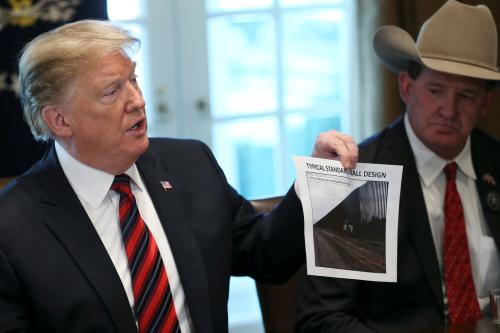Huh. It turns out governmental functions like overseeing airline safety, inspecting food and drug supplies, and processing tax returns are really important. It also turns out that it is not OK to strip 800,000 federal employees and some unknown but large number of contractors of their paychecks. Who knew that governing was so complicated?
After 34 days of a partial government shutdown in which the Trump administration held the federal budget process hostage to his demand for a border wall, President Trump appears ready to deal.
But the fact that it took so long for public pressure to build up is telling–and disturbing. Apparently we needed a month to consider whether it is acceptable to arbitrarily deprive fellow citizens of their pay and livelihood. And to mull whether governmental functions that underpin our social contract and keep us safe are optional, and to conclude we would prefer our government to comply with the federal budget process as laid out in federal law.
How did we come to this? Let’s count the ways.
- We’ve become inured, both to political and policy craziness overall and to governmental shutdowns in particular. Previous shutdowns have taught us that they are unfortunate and difficult but not a threat to our system of governance.
- Many people do not understand or appreciate the value that the federal government provides. This is rooted in a decades-long project to undermine faith in public institutions and prioritize electoral wins and the permanent campaign over policy goals. It is also rooted in some massive policy failures on the part of the federal government, most notably seen in the current post-mortem of the United States’ approach to globalization and its punishing effects on many communities.
- Lastly, we have trouble adjusting our mental frameworks to the fact that normal policy tools and processes do not work with this administration, which has been marked by frequent lies, arbitrary and capricious actions, and limited regard for good governance and the public trust. It is easier to avert our eyes than to conclude we are seeing the erosion of basic governmental institutions and supposedly bedrock values before our eyes.
By misunderstanding the effects of a prolonged partial government shutdown, the administration overplayed its hand. Federal workers and contractors on the brink of financial ruin are not an unfamiliar “other,” the way immigrants and migrant children—other targets of the president’s policies—are to many Americans. Safe air travel is an obvious public good experienced by a significant share of the public, not an arcane policy matter or a benefit limited to specific constituencies. So many people were harmed so visibly that Trump’s intransigence became untenable.
But we may face the same battle and the same outcome–a partial government shutdown–in three weeks, according to the contours of the deal. Will we sustain our outrage? And will we remember that American principles of the rule of law and equality of opportunity apply not just to airline travelers and federal workers, but to everyone, including Muslims and asylum seekers? We shall see.
The Brookings Institution is committed to quality, independence, and impact.
We are supported by a diverse array of funders. In line with our values and policies, each Brookings publication represents the sole views of its author(s).





Commentary
Why did it take a month of shutdown to understand that 800,000 federal workers are our neighbors?
January 25, 2019